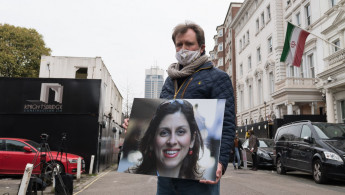British FM 'doing everything' to help Nazanin Zaghari-Ratcliffe after losing appeal
Britain's Foreign Secretary Liz Truss has pledged on Saturday to do "all we can" to help free Nazanin Zaghari-Ratcliffe after the British-Iranian aid worker lost another appeal in Iran.
"Instead of threatening to return Nazanin to prison, Iran must release her permanently so she can return home," Truss told The Independent.
"We are doing all we can to help Nazanin get home to her young daughter and family and I will continue to press Iran on this point."
After Truss assumed office in September, she pledged to ensure the return of Zaghari-Ratcliffe to the UK in some of her first statements.
Labour Party MP Tulip Siddiq said she was informed on Saturday by Richard Ratcliffe, Zaghari-Ratcliffe's husband, that his wife lost her appeal
"Nazanin has lost her latest appeal and her sentence of 1 year plus 1 year travel ban is upheld with no court hearing," Siddiq tweeted.
"She could now be returned to prison at any time. The PM must act now to #FreeNazanin."
Ratcliffe criticised the British government for the way it has handled his wife's case so far.
"Is this going to be a wake-up call for the government?" he told The Independent.
"Maybe, maybe not. One of the challenges I find with this government is that it doesn't deal with problems until they become crises. This is Iran threatening a crisis. One hopes that the government takes it seriously."
Zaghari-Ratcliffe was arrested during a holiday in Iran in 2016 and she was accused of "plotting against the government".
She was sentenced to five years in Evin prison – a facility infamous for its mistreatment of detainees.
Last year, she was moved to Tehran and placed under house arrest, before being convicted of "spreading propaganda against the regime" in April.
Activists last month marked Zaghari-Ratcliffe's 2,000th day of detention by demanding that Britain impose sanctions on 10 Iranian officials accused of involvement in hostage-taking.
"Iran conducts its diplomatic business through hostage-taking, in part because it is cost-free," Richard Ratcliffe said at the time.





 Follow the Middle East's top stories in English at The New Arab on Google News
Follow the Middle East's top stories in English at The New Arab on Google News
![The UAE is widely suspected of arming the RSF militia [Getty]](/sites/default/files/styles/image_330x185/public/2024-11/GettyImages-472529908.jpg?h=69f2b9d0&itok=Yauw3YTG)
![Netanyahu furiously denounced the ICC [Getty]](/sites/default/files/styles/image_330x185/public/2024-11/GettyImages-2169352575.jpg?h=199d8c1f&itok=-vRiruf5)
![Both Hamas and the Palestinian Authority welcomed the ICC arrest warrants [Getty]](/sites/default/files/styles/image_330x185/public/2024-11/GettyImages-2178351173.jpg?h=199d8c1f&itok=TV858iVg)